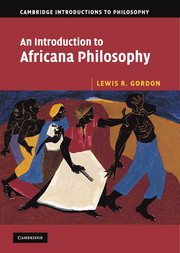1 - Africana philosophy as a modern philosophy
Published online by Cambridge University Press: 05 June 2012
Summary
There is much debate over the meaning and moment of “modernity.” In most North American philosophical courses, modernity begins more with a whom than with a when, and that person is René Descartes. In some fields, such as political philosophy, the who sometimes refers to Niccolò Machiavelli, in whose thought could be found proto-modern ideas. And still others would begin with Thomas Hobbes (1588–1679). For the most part, the when of modernity in this sense arises approximately from the fifteenth into the sixteenth centuries. Other theorists of modernity argue that the modern should not be looked at in terms of a set of ideas by an individual thinker but a set of circumstances that form systems in which people think. Recall from our introduction that in the fifteenth century Christendom looked eastward for the center of the world, which was considered to be India. Seeking a shorter route to the east by going westward around what was then thought to be a smaller planet, they encountered a world which challenged their previous point of center. With the Atlantic Ocean displacing the Mediterranean Sea as the leading place of maritime commerce, the center moved westward and northward in an expanding Christendom, and Europe came into being as the modern world. Christopher Columbus's landing in 1492 thus signaled more than a successful expedition. It signaled the birth of a new age.
- Type
- Chapter
- Information
- An Introduction to Africana Philosophy , pp. 21 - 32Publisher: Cambridge University PressPrint publication year: 2008



